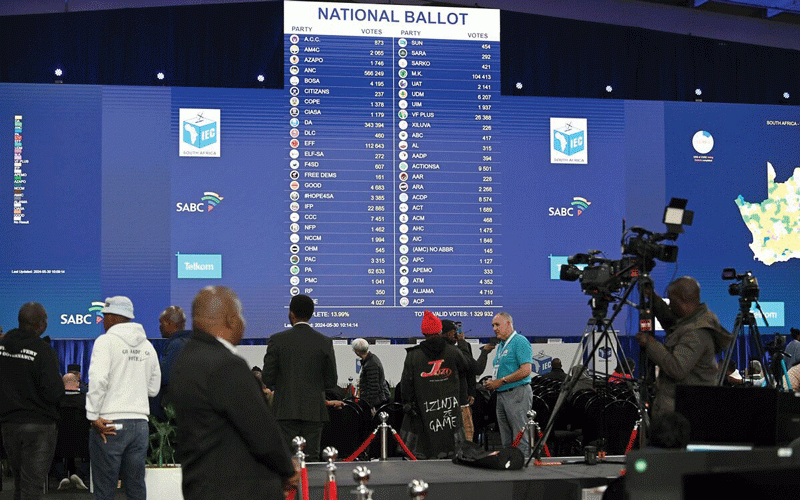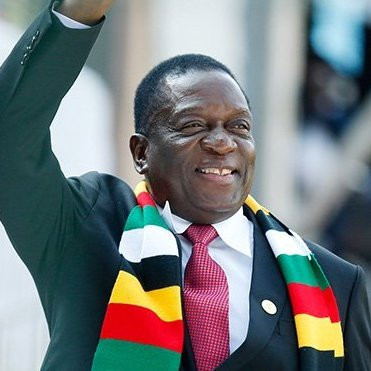
THE just ended election in South Africa justifies the need for independent electoral commissions in Africa.
The neighbouring country’s Independent Electoral Commission (IEC)’s transparency during the May 2024 election is an example, which Zimbabwe and other African countries should copy.
Across Africa, a powerful undercurrent of change is surging.
The continent is brimming with potential.
The IEC, tasked with specific mandates, played a critical role in the South African election which few had expected.
Electoral bodies must be watchdogs, exercising their constitutional powers without interference.
The definition of democracy prevailed in South Africa, IEC displayed election results in real-time.
Unlike the Zimbabwe Electoral Commission (ZEC) which operates under the yoke of the Zanu PF government, the IEC was not just the facilitator, but it displayed authority and control over South Africa’s election.
- Corruption Watch: Get scared, 2023 is coming
- Corruption Watch: Get scared, 2023 is coming
- Letters: Ensuring Africa’s food security through availability of quality seeds
- Is military's involvement in politics compatible with democracy?
Keep Reading
The majority of South Africa’s political parties did not dispute election results as announced by IEC due to transparent electoral processes.
The revolutionary party African National Congress (ANC) received only 40.18% of the total votes cast, followed by the main opposition Democratic Alliance (DA) who got 21.81% while the Jacob Zuma’s MK party got 14.58% and Economic Freedom Fighters (EFF) received 9.52% of the total votes.
Surprisingly, ANC leader Cyril Ramaphosa was caught on camera laughing after the results were announced.
According to IEC, 27.7 million South Africans registered to vote, but only 16.2 million votes were cast on election day.
The effectiveness of IEC hinges on one crucial factor that is independence.
When a commission lacks independence, its ability to function as an impartial arbiter and a catalyst for positive change becomes severely compromised.
This is the reason the Zimbabwe Anti-corruption Commission has no impact because it was never independent; it is a Zanu PF government strategy to counter narratives on corruption.
A government-controlled commission is unlikely to challenge the very power structure it's beholden to.
The comparison of IEC and Zec reveals how Ramaphosa is not a good friend.
He came to support President Emmerson Mnangagwa after he won a disputed election in August 2023.
Back home, South Africa has done the unthinkable where democracy conquered in the May 29 election.
When commissions are seen as fair and impartial, they earn the trust and confidence of the public. This fosters a sense of ownership in the democratic process and encourages citizens to participate actively in shaping their nation's future.
The journey towards a more independent commission system in Africa is not without its challenges.
Political interference, resource constraints, and a lack of public awareness can all impede progress. However, several successful examples like in Zambia, Kenya and South Africa demonstrate the positive impact that independent commissions can have.
Africa's future is bright, brimming with potential.
By fostering a culture of independence for its electoral commissions, the continent can ensure a future where democracy prevails. Independent commissions are not a luxury; they are the cornerstone of a thriving, inclusive, and prosperous Africa.
Commissions, those vital cogs in the machinery of governance, occupy a unique space.
Tasked with overseeing specific functions, from elections to human rights, their effectiveness hinges on a crucial element, independence.
Imagine an election overseen by a commission beholden to a particular political party. The potential for manipulation becomes stark.
Conversely, an independent commission fosters trust in the process, ensuring a level playing field and credible outcomes.
This extends to other realms as well. A human rights commission lacking independence risks becoming a toothless tiger, unable to hold powerful actors accountable.
Independent commissions serve as impartial arbiters, their decisions based on objective criteria rather than political or personal agendas.
This fosters public confidence in the system and strengthens the legitimacy of the commission's work.
Commissions often face difficult choices. An independent body can make these decisions with a clear conscience, guided solely by its mandate.
For instance, Zec must be an independent Chapter 12 institution as established in terms of Section 238 of the constitution of Zimbabwe and act responsibly for the management and administration of Zimbabwe's electoral processes.
However, in reality there is a thin layer between Zanu PF and Zec, even the selection of Zec commissioners can show that Zec and Zanu PF party dovetail.
Zec is beholden to external forces which have jeopardised its mandate.
Looking at the paradigm shift in African political winds, power can shift anytime, just like in South Africa, ANC will need coalition partners to surpass 50% votes and form a government.
I wonder what Mnangagwa spokesperson George Charamba felt after the ANC lost parliamentary majority and failed even to settle a 50 percent score of the total votes cast.
Commissions often operate in areas ripe for manipulation, but IEC sent a good message to the African community.
Electoral commissions must act as a safeguard against such manipulation. Their autonomy should ensure a fair playing field for all, promoting transparency and accountability in critical areas. This, in turn, fosters a healthy free and fair election.
Independent commissions are essential for ensuring the proper functioning of a healthy democracy.
Free from undue influence, they can deliver on their mandates effectively, fostering trust, upholding impartiality, and making tough decisions for the public good.
*Evans Mathanda is a multimedia journalist and development practitioner, who writes in his capacity. For feedback email: [email protected] or call 0719770038 and X @EvansMathanda19










